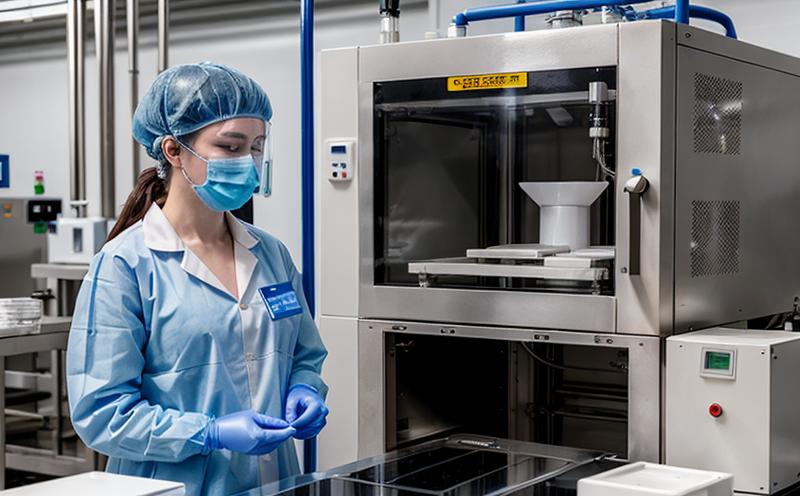GMP Reference Standard Qualification Testing
The Good Manufacturing Practice (GMP) is a globally recognized framework that ensures high standards of quality in the manufacturing, testing, and distribution of pharmaceutical products. GMP compliance is crucial for ensuring that medicines are safe, pure, and potent as prescribed by regulatory bodies such as the FDA, EMA, and WHO.
One critical aspect of maintaining GMP compliance involves the qualification of reference standards used throughout the production process. Reference standards serve as benchmarks against which all other quality control measures must be validated. Any deviation from these standards can lead to inconsistencies in product efficacy or safety, potentially causing severe health risks for patients.
Our service focuses on providing comprehensive GMP Reference Standard Qualification Testing. This involves a series of rigorous tests designed to confirm that the reference materials meet all relevant specifications and perform consistently across multiple batches. The process includes:
- Validation of Analytical Methods: Ensuring that analytical methods used are accurate, precise, reproducible, and robust.
- Bioburden Testing: Assessing the presence of microorganisms or other contaminants to ensure sterility.
- Toxicity Assessment: Determining if the reference standard is safe for intended use in manufacturing processes.
- Purity and Impurity Analysis: Identifying any impurities that may affect product quality.
The results of these tests are critical to ensuring that pharmaceutical products meet stringent regulatory requirements. By validating reference standards, we help our clients maintain consistent quality control throughout their production processes, thereby upholding the integrity of all products released for market use.
Our laboratory adheres strictly to international standards such as ISO 17025, ICH Q6A, and FDA guidelines. This ensures that every test conducted is accurate and reliable, providing confidence in the qualification of reference standards used within pharmaceutical manufacturing processes.
Why It Matters
The importance of GMP Reference Standard Qualification Testing cannot be overstated. In a highly regulated industry like pharmaceuticals, even small discrepancies can have significant impacts on patient safety and product efficacy. By qualifying reference standards through this testing process, we ensure that:
- Manufacturers can consistently produce high-quality products.
- All batches of materials used in production meet the required specifications.
- The integrity of pharmaceutical products is maintained from raw materials to final dosage forms.
In addition, successful qualification of reference standards demonstrates a commitment to quality and reliability, which enhances trust between manufacturers, regulatory bodies, and healthcare providers. This trust is essential for fostering confidence in the safety and efficacy of medicines, ultimately benefiting public health.
Our laboratory plays a vital role in this process by offering expert testing services that align with global best practices. By partnering with us, clients can ensure their reference standards are qualified to the highest standards, contributing to the overall quality assurance efforts within their organizations.
Quality and Reliability Assurance
The pharmaceutical industry relies heavily on reliable and consistent quality control measures to ensure patient safety and product efficacy. GMP Reference Standard Qualification Testing is a cornerstone of these efforts, providing critical data that validates the performance and consistency of reference materials used in manufacturing.
In this section, we delve into the key aspects of our testing process aimed at ensuring both quality and reliability:
- Method Validation: Ensuring analytical methods are robust and reproducible. This includes validating techniques for purity, impurity analysis, bioburden testing, and toxicity assessment.
- Bioburden Testing: Assessing the microbial load to ensure sterility is maintained throughout production processes.
- Toxicity Assessment: Evaluating potential adverse effects on human health due to impurities or contaminants present in reference materials.
The data generated from these tests provides essential information for manufacturers to make informed decisions regarding the use of reference standards. It also supports regulatory compliance and helps build trust with stakeholders, including healthcare professionals and patients.
Our laboratory uses state-of-the-art equipment and follows stringent protocols to ensure accurate and reliable test results. By adhering strictly to international standards such as ISO 17025, ICH Q6A, and FDA guidelines, we maintain the highest levels of integrity in our testing processes. This ensures that every reference standard qualified by us meets the strictest quality requirements.
Use Cases and Application Examples
| Use Case | Application Example |
|---|---|
| Pharmaceutical Drug Development | In drug development, reference standards are used to establish purity and impurity levels. Our testing ensures that these levels meet regulatory requirements before moving into clinical trials. |
| Raw Material Procurement | When sourcing raw materials, reference standards are used to ensure consistency and quality. Our testing ensures that incoming materials meet specified criteria before being incorporated into production processes. |
| Packaging Material Validation | Packaging materials must be free from contaminants to prevent degradation of the product. Our testing ensures that packaging materials meet stringent purity and bioburden standards. |
| Manufacturing Process Optimization | In optimizing manufacturing processes, reference standards are used as benchmarks for process validation. Our testing ensures that the processes remain consistent and meet all regulatory requirements. |
| Quality Control Audits | During quality control audits, reference standards are used to verify compliance with GMP guidelines. Our testing ensures that all batches of materials meet the required specifications. |
| Product Release Testing | Before releasing products for market, reference standards are used to ensure product quality. Our testing ensures that all batches released meet stringent purity and impurity criteria. |
| Clinical Trial Compliance | In clinical trials, reference standards are used to ensure consistency in the manufacturing process. Our testing ensures that all batches used in clinical trials meet regulatory requirements. |
The data generated from this testing is invaluable for ensuring consistent quality throughout the entire pharmaceutical supply chain. From drug development to product release, our tests play a crucial role in maintaining compliance with GMP regulations and ensuring patient safety.





